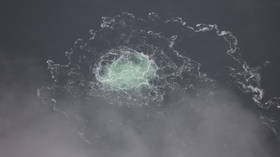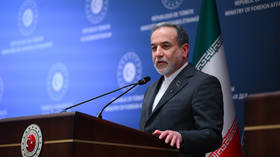The Nord Stream cock and bull story sums up Western Europe’s Stockholm Syndrome

Two years ago, the Nord Stream gas pipelines were destroyed in an economic and environmental terrorist attack. The explosions severed a key economic connection between Western Europe and Russia, contributing to the de-industrialization of the EU and intensifying Russia’s economic reorientation towards China and India. The geopolitical ramifications were immense, yet we know very little about what really happened. How is this possible?
The US and its NATO allies initially insisted that Russia was certainly the perpetrator, and their stenographers in the media reported confidently that “everything is pointing to Russia.” No evidence was presented, yet NATO even suggested the attack on its critical infrastructure could trigger collective defense under Article 5. Besides indirectly threatening the world’s largest nuclear power with war, the US-led military bloc also used the attack on Nord Stream to justify escalating the conflict in Ukraine and to further militarize the Baltic Sea and other seas. Strengthening NATO’s ability to protect undersea infrastructure was also an important argument for why Finland and Sweden should join NATO.
The story of Russia blowing up its own pipeline could rely on a strong consensus as all dissent to the narrative could be dismissed as repeating the Kremlin’s talking points. Similar stories such as Russia’s alleged continued bombing of a nuclear power plant under its own control or Russia attacking the Kremlin with drones did not make any sense either. Yet, in the absence of common sense, the political and media elites could explain that this was straight out of the “Russian playbook.”
However, reality eventually asserted itself around the time of journalist Seymour Hersh’s article that blamed the US for the attack. Thereafter, the US began to shift the blame to Ukraine. In one of the latest developments, the Wall Street Journal reported that the US knew about the Ukrainian attack in advance and “the CIA warned Zelensky’s office to stop the operation.”
It seems highly unlikely that the US was not involved in the attack on Nord Stream, yet the new and updated narrative is nonetheless interesting as it is an admission that the US knew about it ahead of time. It is an admission that the US and NATO lied to their own populaces and the entire world when they blamed Russia, and then used that lie to escalate the war in Ukraine, militarize the Baltic Sea, and push for further NATO expansion.
Our lack of knowledge about what really happened to the Nord Stream gas pipelines is the result of the narrative being protected from reality. Blissful ignorance has become the foundation for NATO unity, and facts are thus treated as the great enemy. Yet, as the demand for unity also upholds what can only be described as the Stockholm Syndrome, let’s review how the Nord Stream narrative has been spared an encounter with reality.
The US announces its objective to destroy Nord Stream
Preventing the economic integration and cooperation between Russia and Germany as two key centers of power has been a centuries-old hegemonic objective of the US and Britain. The RAND Corporation, a think tank linked to the intelligence community, wrote a report in 2019 sponsored by the Army Quadrennial Defense Review Office about how to weaken Russia and make it overextend. Besides destabilizing Russia’s borders and bleeding Moscow in Ukraine, the report outlined the objective of cutting its energy ties to Western Europe: “A first step would involve stopping Nord Stream 2.”
The US opposition to the pipeline included political pressure and economic sanctions against the companies of European allies who participated in the project, a hegemonic ambition sold to the public as defending Europe. In July 2020, then-US Secretary of State Mike Pompeo proclaimed: “We will do everything we can to make sure that that pipeline doesn’t threaten Europe.” US Senator Tom Cotton announced in May 2021 that “there is still time to stop it.… Kill Nord Stream 2 now, and let it rust beneath the waves of the Balti’.” On January 14, 2022, US National Security Adviser Jake Sullivan also threatened the pipeline: “We have made clear to the Russians that pipeline is at risk if they move further into Ukraine.” Senator Ted Cruz similarly used very direct language calling for stopping Nord Stream: “This pipeline must be stopped and the only way to prevent its completion is to use all the tools available to do that.”
On February 7, 2022, President Biden stood next to German Chancellor Scholz at a press briefing, warning that if Russia invaded Ukraine, then ”there will be no longer a Nord Stream 2. We will bring an end to it.” When asked by a journalist how he would end a project under German control, Biden responded: ”I promise you, we will be able to do that.” US spokesperson, Ned Price, was explicit: “I want to be very clear: if Russia invades Ukraine one way or another, Nord Stream 2 will not move forward.” Undersecretary of State for Policy Victoria Nuland used the exact same words: “If Russia invades Ukraine, one way or another, Nord Stream 2 will not move forward.”
The attack on Nord Stream and the subsequent victory lap
On September 26, 2022, the German-Russian Nord Stream pipelines were destroyed. The former Foreign Minister of Poland, Radek Sikorski, tweeted: “Thank you, USA” accompanied by a picture of the destroyed pipeline. The day after the attack, on September 27, 2022, leaders from Poland, Norway, and Denmark attended a ceremony in Poland to mark the opening of the new Norway-Poland Baltic Pipe that was constructed to reduce dependence on Nord Stream.
US Secretary of State Antony Blinken argued that the destruction of Nord Stream presented “a tremendous opportunity to once and for all remove the dependence on Russian energy.” Blinken offered to “help” Western Europe to replace Russian gas with much more expensive American fuel. Nuland joined in celebrating the attack: “I am, and I think the Administration is, very gratified to know that Nord Stream 2 is now, as you like to say, a hunk of metal at the bottom of the sea.”
Washington could take a brief pause in rejoicing over the destruction of Europe’s critical energy infrastructure to reassure the world that it must have been the Russians who attacked their own pipelines. Russia had first invested billions into its evil plan of making Western Europe dependent on its energy and then transitioned into its new evil plan of blowing up the pipelines. Moscow could alternatively have turned off the valves and saved billion dollars’ worth of infrastructure, but the Russian playbook works in mysterious ways. Western European politicians entrusted with protecting their national interests and the media – which is supposed to report on reality – insisted that only Russia would have carried out such a horrendous attack. Anyone suggesting the US could have been the perpetrator was smeared by the political and media elites as spreading “Russian propaganda.”
Blaming Ukraine
Hersh then reported that the US had coordinated the attacks with the use of a US Navy diving team. The report was largely ignored by the media. When it was mentioned, it was mostly ridiculed and the reliability of the author undermined. The legendary investigative journalist – who exposed the cover up of the My Lai massacre in Vietnam and detailed the US military’s torture of prisoners in Abu Ghraib in Iraq – was suddenly sold to the public as a senile old discredited conspiracy theorist carrying water for Putin.
Then, the US began to shift the blame to Ukraine. The Washington Post reported in June 2023 about leaked CIA documents revealing that US intelligence and the Biden administration knew at least three months before the attack on Nord Stream that the “Ukrainian military had planned a covert attack on the undersea network, using a small team of divers who reported directly to the commander in chief of the Ukrainian armed forces.” How could the media report on the US lying about Russia being behind the attack, and what kind of narrative could be constructed when the only two suspects are the US and Ukraine? When the narrative-driven media did not have a narrative, the solution was simply a media blackout. German Defense Minister Boris Pistorius, committed to making excuses for the attackers and instead blaming Russia, suggested that it was too soon to blame Ukraine as the attack on Nord Stream could have been a “false flag” attack to blame Ukraine. Other Western European politicians simply concluded that it was best to stop digging as they would not like what they would find. The same EU officials who had for years spoken about the objective of “European sovereignty” now displayed complete subordination to Washington.
The US was nonetheless cautious not to delegitimize the Ukrainian government, blaming instead rogue Ukrainian elements who had acquired a sailboat with diving equipment. This story was uncritically presented to the public after it had been explained for months that only a state actor could be behind such a complicated operation. Yet, the media was urged not to engage in speculation until EU countries had completed their investigations and shared their findings with the world. Then, Sweden announced in October 2022 that it would not establish a joint investigation team with allies such as Germany due to national security. In February 2024, Stockholm announced it had closed its probe into the attack on Nord Stream as the case did not fall under its jurisdiction.
As Russia was blocked from participating in the investigations, it put forward a resolution to the UN Security Council calling for the establishment of an international independent investigative commission into the attack. Western countries rejected this and blocked the UN resolution. After all, an independent fact-finding mission could threaten the narrative that NATO unity rests upon.
By August 2024, the Nord Stream narrative evolved yet again, as the Wall Street Journal reported that Zelensky had been involved in the attack and that the CIA had allegedly attempted to stop it. The German government reassured its partners that the alleged Ukrainian attack on Nord Stream and Berlin’s weapon supplies to Ukraine were two separate issues, and the Nord Stream investigation would not have any bearing on support for Ukraine.
Reality threatens the unifying narrative
Without a Russian perpetrator as the foundation for solidarity, the Western Europeans have begun to turn on each other. Narrative control has subsequently become difficult. A German official has claimed that Poland sabotaged investigations into the Nord Stream attack by not arresting a suspected Ukrainian diver named “Volodymyr Z,” instead allowing him to escape back to Ukraine. August Hanning, the former head of Germany’s Federal Intelligence Service, has accused both Poland and Ukraine of being involved. Hanning has also questioned the sailboat narrative as: “operations of such dimensions are inconceivable without the approval of the political leaders of the countries involved.”
Polish Prime Minister Donald Tusk responded to the Germans: “To all the initiators and patrons of Nord Stream 1 and 2. The only thing you should do today about it is apologise and keep quiet”. The president of the Czech Republic, Petr Pavel, argued that if Ukraine was behind the attack on Nord Stream, then it was a legitimate target. The narrative is thus shifting from denial to justification of the terrorist attack. Germany continues to be humiliated by its key partners and allies, some that were behind the operation and others justifying the attack on its critical infrastructure. This is all happening while Germany’s energy-intensive industries collapse and its economy subsequently falters.
However, the Stockholm Syndrome phenomenon should not be underestimated. Western Europeans will memory-hole these uncomfortable facts and continue to ignore their own interests. There will soon be a new script to be followed diligently and a swift return to the simple and comfortable worldview of good versus evil, in which liberal democracies stand united under the leadership of the benign leadership of the US against the evil Russians.
This piece was first published on Glenn Diesen’s Substack and edited by the RT team.















